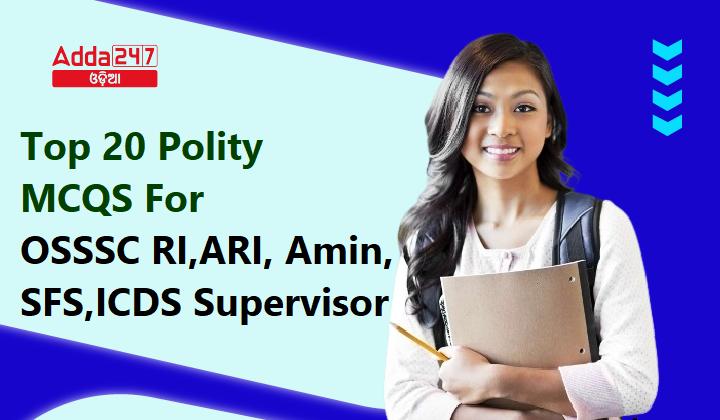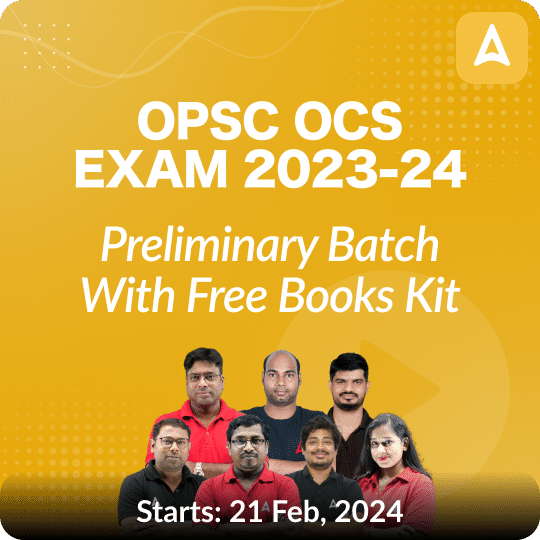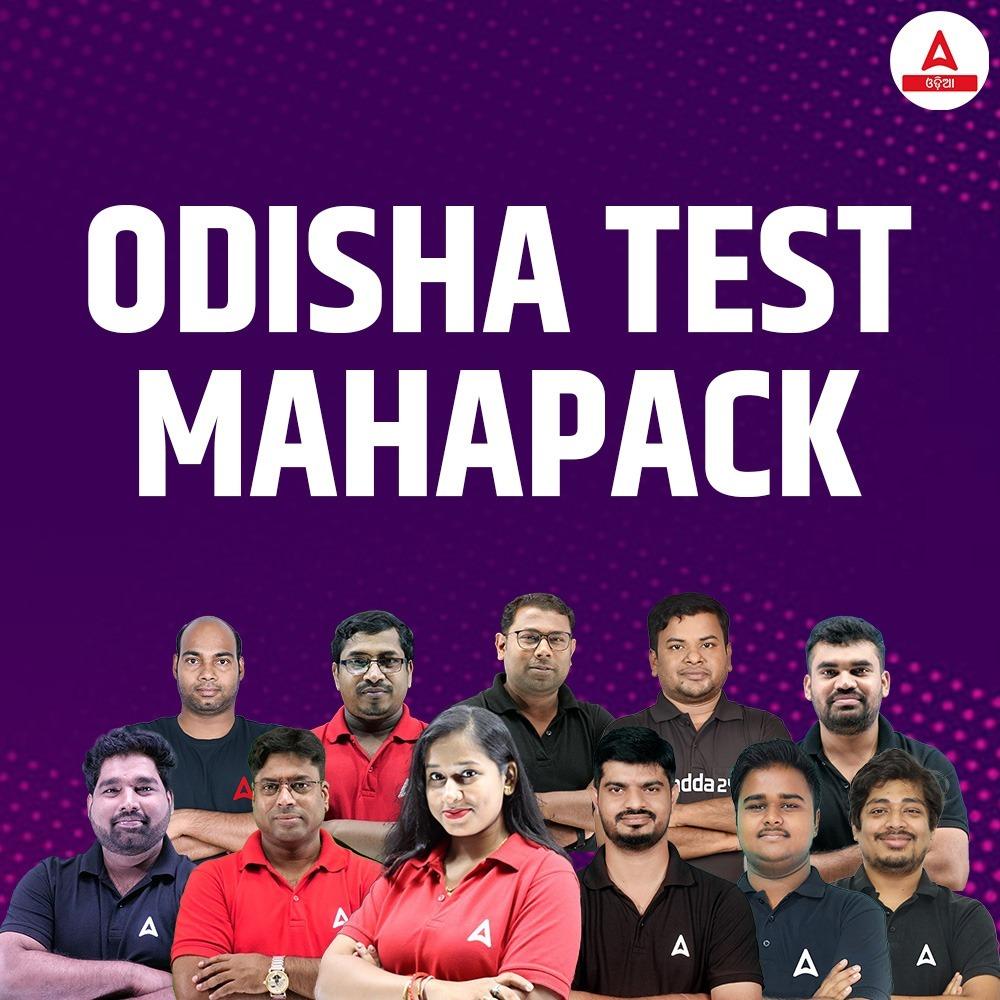Top 20 Polity MCQS For OSSSC RI,ARI, Amin, SFS, ICDS Supervisor
Preparing for competitive exams like the OSSSC RI, ARI, Amin, SFS, and ICDS Supervisor requires a solid grasp of general studies. Here are the top 20 multiple-choice questions (MCQs) along with their answers:
Q1. Article 368 of the Indian Constitution deals with
(a) Right to Primary Education
(b) Emergency Provisions
(c) Right to Information
(d) Amending Procedure
S1.Ans.(d)
Sol. Article 368 of the Constitution of India deals with the amendment process. It empowers Parliament to amend the Constitution by way of addition, variation or repeal of any provision As per the procedure laid down therein, which is different from the procedure for ordinary legislation.
Q2. The 73rd Constitutional amendment act is associated to:
(a) Finance Commission
(b) Forule Exchange
(c) Panchayat Raj
(d) RBI
S2.Ans.(c)
Sol. The Constitution (Seventy-3rd Amendment) Act, 1992 is associated to Panchayati Raj in India. It added Part IX of the Constitution of India, associated to Panchayats, & the Eleventh Schedule to the Constitution which deals with matters on which the Panchayats may be devolved with powers & responsibility by the State Legislatures by law.
Q3. Indian Parliament consists of
(a) Lok Sabha and Rajya Sabha
(b) Lok Sabha, Rajya Sabha and Prime Minister
(c) Speaker and Lok Sabha
(d) President and both the Houses
S3.Ans.(d)
Sol. Indian Parliament consist of President and both the house.
Q4. Which of the following is the most appropriate tool to raise the issue of Naxalism activities in the Lok Sabha?
(a) Calling attention motion
(b) Discussion under Rule 377
(c) Censure motion
(d) Short duration discussion
S4.Ans.(a)
Sol. Calling attention is a type of motion introduced by a member to call the attention of a minister to a matter of urgent public importance.
Q5. Who is the Chairman of the Rajya Sabha?
(a) The President
(b) The Vice-President
(c) The Prime Minister
(d) The Speaker
S5.Ans.(b)
Sol. The Vice President of India is the ex-officio Chairman of the Rajya Sabha, who presides over its sessions.
Q6. Rajya Sabha can delay the Finance bill sent for its consideration by the Lok Sabha for a maximum period of
(a) One month
(b) One Year
(c) Seven day
(d) Fourteen days
S6.Ans. (d)
Sol. Rajya Sabha can delay the Finance Bill sent for its consideration by the Lok Sabha for a maximum period of fourteen days.
Q7. The state wise allocation of seats in Lok Sabha is based on the 1971 census. Up to which year does this remain intact?
(a) 2031
(b) 2026
(c) 2021
(d) 2011
S7.Ans. (b)
Sol. The state wise allocation of seats in Lok Sabha is based on 1971 census and this remain upto 2026 under article 82.
Q8. A bill presented in Parliament becomes an Act after
(a) It is passed by both the Houses.
(b) The president has given his assent
(c) The Prime Minister has signed it
(d) The Supreme Court has declared it to be within the competence of the Union Parliament
S8.Ans. (b)
Sol. Under Article 53 of the constitution power of president mentioned. Any bill presented in parliament becomes an act after president’s assent.
Q9. Article 21A of the Constitution of India provides Right to ______.
(a) Equality
(b) Work
(c) Education
(d) Privacy
S9.Ans. (c)
Sol.Article 21-A in the Constitution of India provides free and compulsory education of all children in the age group of six to fourteen years as a Fundamental Right in such a manner as the state may, by law, determine. This provision was added by 86th Constitutional Amendment Act, 2002.
Q10. The Joint Session of both the Houses of Parliament is summoned by
(a) President
(b) Speaker of the Lok Sabha
(c) Prime Minister
(d) Chairman of Rajya Sabha
S10.Ans.(a)
Sol.In case of a difference between the two Houses over a non-money bill, the President may call a joint sitting of the Houses. No bill will be regarded as passed by the Parliament unless both the Houses approve of it.
Q11. Who among the following gave monistic theory of sovereignty?
(a) Austin
(b) Darwin
(c) Aristotle
(d) Marx
S11. Ans.(a)
Sol. In the 19th century the theory of sovereignty as a legal concept was perfected by Austin, an English Jurist. He is regarded as a greatest exponent of Monistic Theory.
Q12. In which of the following cases Supreme Court held that preamble is not a part of the Indian Constitution
(a) Berubari case
(b) K. Gopalan case
(c) Balaji Case
(d) Minerva Mill’s case
S12. Ans.(a)
Sol. In the Berubari Case in 1960, the Supreme Court declared that the Preamble is not a part of the Constitution.
Later in the KesavanandaBharati Case in 1973, it held that the Preamble is a part of the Constitution.
Q13. The term of office of the Vice-president of India is
(a) 5 yrs
(b) 4 yrs
(c) 2 yrs
(d) 6 yrs
S13.Ans.(a)
Sol. The Vice-President holds office for five yrs. However, the office may be terminated earlier by death, resignation or removal. He can be re-elected any number of times.
Q14. Who was the second woman to become the president of the Indian National Congress in 1925 and the first Indian woman to do so?
(a) VijaylakshmiPandit
(b) Sarojini Naidu
(c) Padmaja Naidu
(d) Fathima Bibi
S14. Ans.(b)
Sol.Sarojini Naidu in 1925.
Q15. The number of parliamentary seats (Lok Sabha) of Gujarat is
(a) 10
(b) 26
(c) 28
(d) 48
S15. Ans.(b)
Sol. 26
Q16. Who administers the oath of office to the President of India?
(a) Lok Sabha Speaker
(b) Vice President
(c) Chief Justice of India
(d) Prime Minister
S16. Ans.(c)
Sol.The Chief Justice of India administers the oath of the office to the President. In case the Chief Justice of India is unavailable the oath shall be administered by the senior most judge of the Supreme Court of India.
Q17. Unless he is produced before a magistrate an arrested persons cannot be detained by the police for more than?
(a) 12 hours.
(b) 24 hours.
(c) 36 hours.
(d) 48 hours.
S17. (b)
Sol. 24 hour’s.
Q18.Who among the following was the deputy speaker of the first loksabha?
(a) Mnkaul.
(b) Rabi ray.
(c) Akgopalan.
(d) M.A ayyangar.
S18.(d)
Sol. Ayyangar was the first loksabha speaker of india.
Q19.when was the finance commission established?
(a) 20 November 1951.
(b) 22 November 1951.
(c) 28 November 1951.
(d) 30 November 1951.
S19. (b)
Sol. 22 November 1951.
- First executive:-kshitish Chandra neogy.
- Preceding executive:-Dr. Y. V Reddy.
Q20. Constitution of India day is observed on which date?
(a) 26 November 1949
(b) 26 January 1950
(c) 26 November 1929
(d) 26 January 1929
S20.(a)
Sol. On 26 November 1949,the constitution was brought before the Indian constituent assembly. This is the reason that 26 November is celebrated every year in the country as the constitution day.










